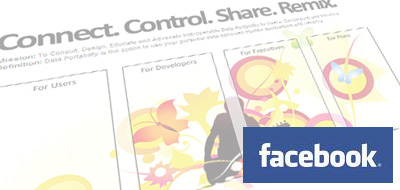There are many things i love about the world we live in- one is the power of the 'user' (i have always been one for group protests and group advocacy!) and i personally think that it fair to say that Facebook's new announcement last night on
Opening Up Facebook Status, Notes, Links, and Video to Facebook Platform is about the users and developers who represent the 'facebookers' demanding that their user data is 'open'- if no one was asking and threatening to go elsewhere as they find other great services they probably wouldn't be listening.
Looking back at the last year -
Scoblegate was only 13 months ago!- there have certainly been a lot of steps towards the
vision and mission that the DataPortability Project has been working towards and personally it is fulfilling to see these large vendors taking heed and listening to their 'users'.
These steps by the big vendors are quite important but also need to be reviewed as to what their end game is. Over on the
DataPortability Blog, Steve Repetti one of the
DataPortability Project steering committee members and a huge advocate of
dataportability in his own products writes:
"On the one hand there is very little about this that is open. Facebook controls the data, its access, and its availability. Facebook defines the integration, they determine the protocols, and the APIs, and even who can and cannot use any of this. This “openness” is all under the oversight, control, direction, and whim of the giant."
Facebook controls the data, its access, and its availability. Facebook defines the integration, they determine the protocols, and the APIs, and even who can and cannot use any of this. This “openness” is all under the oversight, control, direction, and whim of the giant."
I agree with Steve's sentiment that, "
Facebook has made huge strides in extending its world beyond the looming walls of their garden" and i certainly look forward to hearing more feedback from the developers who will be working with the APIs over the next few days as to what is truly possible based on the APIs that have been made available.
Reading through some of the other
commentary this afternooon, i love
Dare Obasanjo's comment '
Facebook is now acknowledging that their users use other websites and integration with those sites doesn't require these sites to become sharecroppers on the digital farmland that is the Facebook canvas page. '-yep. the main difference is that the value of the experience will perhaps no longer need to be within facebook- and that is just one of the reasons that supporting data portability is valuable to the user and the ecosystem as a whole.
and two additional comments have to make...
1. i find it interesting that facebook chose to make
this announcement at 4:54pm PST- when most of the world has called it quits for the day and many for the weekend as they go about their lives
2. i realize that this is a 'developer' announcement and that the general user doesn't care much for API related information- but shouldn't the
facebook blog post an overview for what this means to the facebook "user"? You know that person that 'friended' you last month that is not involved in the tech scene- currently spends little to no time on other social networks sites being that they only recently got 'on board social networking' and because facebook was the first one they joined they have no idea what this all means about moving around their user data?



![Reblog this post [with Zemanta]](http://img.zemanta.com/reblog_e.png?x-id=bfbd711e-3945-4d8a-a2be-8f628934947b)


